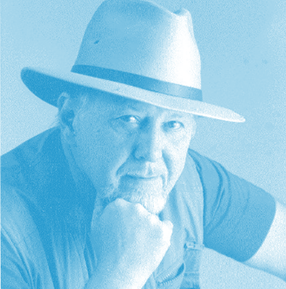GIN RUMMIES
To find a friend one must close one eye.
To keep him—two.
—Norman Douglas
for Rodney Formon
Friday nights, a fry-cook,
arms scarred by sizzling fat,
Rodney bangs on my door.
We like to drink together,
shoot the breeze, and laugh.
Drunk enough, we sing!
It’s karaoke with CDs scattered
on the table, improvisational
shandygaffs and combinations
you can’t enjoy with your relations.
It’s good to have a drinking buddy.
I’ve used up two already—
one who fell down a flight of stairs
and one, who was much older,
who died of his warrior life.
But now I’ve got Rodney,
who is very different from the others.
The other two were quite and somewhat
intellectual, and where the one
could talk history or science, art,
music, or just about any subject
in just about any language and come back,
being polyglot, and polymath,
even polymorphic, after hooch;
the other was a man of action,
a war hero with many medals
tucked away in drawers locked
by indifference, but still would tell of
weapons, arms and the man, and such
with fervor—my Heraclitus—
and also with disgust, with
fatalism, believing nothing
changes in man’s fighting nature,
disposed to think the worst;
but enthusiastic over chess,
which he played in earnest
as if he were at war again.
But Rodney is another sort:
He knows I write but will not read
a word I write, nor much else either,
but likes the Internet so much
he slides crabwise in thought,
toward what depth of cyberspace
I often cannot fathom until zing
I see it for myself, or am I drunk?
I see with Rodney that the other two,
complimented first my young and then
my middle-aged delusions
of a deeper self-knowledge
than available to most. Yes, Rodney
shows me to myself, or shows me
to my youthful ghosts, as ego-fed,
but did and does this unintentionally,
whose wonderful indifference makes me shrink
like a cock in the cold, and chug my drink.
THE FIDDLER
An Appalachian Tale
Played the devil’s fiddle, stomping to it, shaking it out,
full of corned blood, his boot down down down!
Days before the corn, his old bitch Lucy lay by his piston heel.
Said later she smelled it, stayed by it, waiting
for the meaty bone; said later never done him no harm at all;
said later not even a ghost of evil but Lucy got it,
old bloodhound bitch like red clay, wrinkled old lady hanging
from her own bones—could make her moon-howl,
pointing his wild bow—do that at dances. Devil in a Baptist,
playing the fiddle. Gradual as the mountains,
he found out how the devil got in. Fiddle under his spiked,
gray chin, corn jug thumb-hooked and cradled on top
his elbow—capful for Lucy—then stomp stomp stomp: music
through Blue Ridge pines! Could choo choo it
so’s you see smoke and steam, hear that wheezy accordion whistle;
could conjure with it up a trainload of places
or turn you back home to the station of pines and blue smoke
mountains, bring musical rain, or put the devil
in your heart, winking and drinking and stomping. Everybody loved
him and his Lucy, including said devil, as the corn dropped
down into his right big toe. Said it hurt to stomp. But it don’t
stop the fiddler. Don’t nothing stop the fiddler! He was
one thing else than music; he was a man. Take more’n corn going
through, dropping down in my right big toe, says at
the May dance, everybody seeing him stomp, ouch ouch ouch on
his big red gray spiked old corned face. Devil
got in through the corn, slick as silk; got down in my boot,
but I’ll stomp him out; give old Satan a head-
ache—stomp stomp stomp! But that corn went to killing him.
His bow was flying! Went on like this, folks say,
a tad’s five year, him stomping the devil in the corn and the devil
stomping back. Said now he couldn’t play no more if
he don’t get rid o’ that old devil. Takes him a broad wood chisel
out back on a stump, sets his right foot up, sets
that chisel to his toe, and strikes down with a good hefty hammer.
When he pulls back his foot, that devil in the corned toe
stays on the stump, says looka me, I’m off! Has brought him
some fireplace soot and some gingham. Sticks that foot
in that black soot, to staunch the blood, and wraps it in gingham
rags. Said never done him no harm again, quiet as a bone,
and he goes back to stomping in peace, rid of the devil. But
first, he throws that old corned toe to Lucy. Says:
I knowed you always wanted it. Now mind the nail, Lucy; don’t let
the devil get you, you drunk old droop-skinned hound
bitch, cuz I love you. And Lucy goes to lickin’ that toe, pops
it in, and goes to grinding up that devil in her old ground down
chops. And next time we see them, the fiddler and his drunk bitch,
they both full of corn, and ready, now, for the dance!
Schorb’s work has appeared in Agenda (UK), The American Scholar, The Carolina Quarterly, The Hudson Review, The Southern Review, Stand (UK), The Sewanee Review, The Virginia Quarterly Review, The North American Review, Poetry Salzburg Review (AU), The Yale Review, and Oxford Poetry (UK), among others.
His collection, Murderer’s Day, was awarded the Verna Emery Poetry Prize and published by Purdue University Press, and a subsequent collection, Time and Fevers, was the recipient of the Writer’s Digest International Self-Published Award for Poetry and also an Eric Hoffer Award.
Most recently, his novel R&R a Sex Comedy was awarded the Beverly Hills Book Award for Humor.


